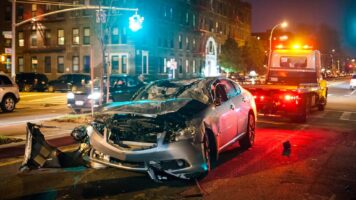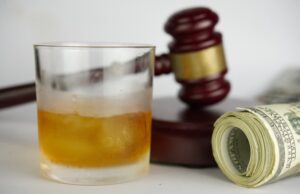Drunk driving represents a highly negligent act, where individuals disregard laws and selfishly operate a vehicle under the influence. Reasons for such negligence range from inconvenience in calling a cab to a misguided belief in sobriety. Regardless of the rationale, there is no justification for the severe and often fatal injuries caused by impaired driving every hour in the country.
If you or a loved one has suffered injuries or loss due to a drunk or impaired driver, a seasoned Cape Girardeau drunk driving accident lawyer is ready to advocate for justice and seek compensation on your behalf.
How Alcohol Impairs Drivers
When a driver consumes alcohol and takes control of their vehicle, the resulting impairment manifests in various ways, including:
- Decreased Reaction Times: Alcohol impairs the ability to react swiftly to stimuli, such as a car turning in front of them or a child running into the roadway.
- Impaired Judgment and Decision-Making: Decision-making skills become compromised, leading to risky choices. For example, an impaired driver may execute a left turn when there isn’t enough time between oncoming traffic.
- Reduced Motor Control: Coordination and motor skills are negatively affected. Drivers may not brake on time or steer their vehicles effectively.
- Blurry or Altered Vision: Vision may become distorted, affecting the ability to perceive the environment accurately.
- Lowered Inhibitions: Alcohol can diminish inhibitions against engaging in risky behaviors.
These detrimental effects can contribute to:
- Increased Stopping Distance: Longer reaction times result in a delayed ability to stop.
- Failure to Recognize Traffic Control Measures: Inability to identify and adhere to road signage and other traffic control measures.
- Erratic Driving Behavior: Including swerving, weaving, running off the road, and failure to detect other vehicles or pedestrians.
- Aggressive Driving Maneuvers: Speeding, dangerous passing, and other unsafe actions.
Drunk Driving Accident Statistics
Drunk driving remains a significant factor in causing numerous injuries and fatal accidents. The Centers for Disease Control (CDC) reveals that about 28 percent of all fatal motor vehicle crashes involve a drunk driver. It’s crucial to recognize the broad spectrum of substances, including both illegal and prescription medications, contributing to these incidents.
While the severity of drunk driving is widely acknowledged, many are unaware of its staggering impact. The following key statistics shed light on the gravity of the issue:
- On average, someone suffers injuries from a drunk driving incident every two minutes.
- Thirty people die every day, equivalent to one fatality every 48 minutes in the United States, due to drunk driving.
- About one-third of all individuals charged with drunk driving are repeat offenders.
- Daily, approximately 300,000 drivers under the influence are on the road, with law enforcement only stopping about 2,800 of them.
- Over 25 percent of all U.S. traffic fatalities result from accidents involving intoxicated drivers.
- The CDC estimates the annual cost of alcohol-related crashes in the United States to exceed $44 billion.
- Alternative estimates suggest a higher price tag, reaching as much as $132 billion annually.
Drunk Driving: Criminal and Civil Liability
A drunk driving accident is a violation of both criminal and civil laws. It’s essential to recognize that the law enforcement agency responding to the incident holds jurisdiction over the criminal aspects related to the drunk driver. Their responsibilities include making arrests, filing criminal charges, and pursuing a conviction within the criminal legal system. However, one imperative aspect of note is that this process doesn’t address the pursuit of compensation for injuries under civil law.
Following a drunk driving accident, the intoxicated driver undergoes arrest and faces multiple criminal charges, the nature of which depends on the specifics of the accident. The criminal courts determine the consequences for the driver, often resulting in penalties such as fines, imprisonment, community service, and suspension or revocation of their driver’s license.
While the criminal justice system seeks to address illegal actions, it doesn’t automatically secure compensation for the damages suffered by the victim. Seeking justice beyond the criminal legal system is a crucial step. A Cape Girardeau drunk driving accident lawyer can play a pivotal role in helping victims pursue significant compensation for the damages they endure.
It’s a common misconception that the criminal justice system’s actions are sufficient to seek justice on behalf of the victim. While drunk driving is unquestionably illegal and offenders face prosecution, the criminal charges and penalties imposed on the at-fault driver, unfortunately, don’t directly address the financial and non-economic damages suffered by the victim.
To ensure a comprehensive pursuit of justice, relying on a compassionate drunk driving accident attorney is essential. Such an attorney can fight for the victim’s rights and work towards obtaining fair compensation, allowing the victim to rebuild their life as much as possible in the aftermath of the incident.
Impaired Driving Driver’s License Penalties in Missouri
First Convictions: A first-time DWI or BAC conviction results in a 90-day suspension of the driver’s license. However, they may be eligible for a Restricted Driving Privilege (RDP).
If they are convicted of operating a commercial motor vehicle while their blood alcohol content is .04 percent or higher, two points will go on their Missouri driver record. They won’t be allowed to drive a commercial motor vehicle for one year.
Multiple Convictions: If someone is convicted of a second intoxication-related traffic offense, no matter the time between convictions, they will generally have a one-year revocation for accumulation of points. If they receive a second conviction for an alcohol- or drug-related offense in the same five years, they can also receive a denial of their driver’s license for five years.
If someone is convicted three or more times of an intoxication-related traffic offense, it will become a ten-year license denial.
The Most Common Injuries Resulting from Drunk Driving Accidents
Drunk driving accidents can inflict a range of injuries, spanning from minor bruises and cuts to severe, life-threatening, or catastrophic conditions. The nature of injuries often correlates with the traumatic impact of the accident. These injuries may include the following:
- Facial injuries, which can result in scarring or disfigurement.
- Soft tissue injuries, especially whiplash, often requiring extended recovery time and physical therapy.
- Fractured bones, notably in the ankles, legs, arms, hands, ribs, and pelvis.
- Fires in accidents that cause burns and potentially causing scarring.
- Spinal and back injuries, including spinal cord injuries that may lead to temporary or permanent paralysis.
- Head injuries, including traumatic brain injuries (TBI).
- Emotional distress, ranging from fear of future accidents to post-traumatic stress disorder (PTSD).
Individuals suffering severe or catastrophic injuries in drunk driving accidents deserve the opportunity to consult with a knowledgeable drunk driving accident attorney. Through a consultation, victims can explore avenues for seeking the compensation they rightfully deserve.
Compensable Damages in Drunk Driving Accidents
Understanding the damages and compensation available after sustaining injuries in a drunk driving accident is crucial. The type and amount of compensation can vary based on multiple factors. Common economic damages that you may be entitled to recover include:
- Medical Expenses
- Lost Wages and Income
- Property Damage
- Future Medical Costs
- Future Lost Wages
Potential non-economic losses that might be eligible for compensation include:
- Pain and Suffering
- Loss of Consortium
- Loss of Enjoyment of Life
- Emotional Distress
- Humiliation
- Mental Anguish
- Wrongful Death
Your drunk driving accident lawyer is instrumental in helping you determine the specific compensation you may be eligible to receive.
Punitive Damages
In cases that go to court, victims of drunk driving accidents often have the opportunity to receive punitive damages. Unlike compensatory damages, punitive damages do not compensate for injuries or losses. Instead, their purpose is to punish the behavior that led to the injury and to deter the at-fault party and others from engaging in similar negligent actions, such as drinking and driving. Only courts have the authority to award punitive damages, and they typically only apply to cases involving gross negligence or intentional misconduct by the at-fault party.
The Value of a Drunk Driving Accident Case
Determining the value of a drunk driving accident claim is a complex process. Various factors contribute to its value, and while an exact prediction is impossible, an experienced drunk driving accident lawyer can leverage multiple resources to estimate potential compensation. Key factors influencing claim value include:
- Severity and type of sustained injuries.
- Level of pain and suffering experienced.
- Any temporary or permanent disabilities incurred.
- Presence of scarring or disfigurement.
- Impact on lifestyle and daily activities.
- Anticipated future medical needs.
- Past medical expenses.
- Duration of time off work and ability to return.
- Legal representation engaged.
To gauge the claim’s value, your car accident lawyer may examine comparable jury awards and even employ mock jury surveys to assess the perceived worth of your case.
Elements of Negligence in Drunk Driving Claims
Similar to various personal injury claims, drunk driving claims hinge on the concept of negligence. To substantiate a drunk driving claim successfully, you and your drunk driving accident attorney must establish the four critical elements of negligence within your case:
- Duty: A duty existed between the intoxicated driver and the injured party, such as the obligation not to drive with a blood alcohol content level exceeding the legally allowed limit.
- Breach of Duty: The motorist violated the duty by consuming alcohol and operating a vehicle.
- Causation: Establishing causation is pivotal in injury claims. The injured party must demonstrate that the actions of the drunk driver directly caused their injuries, forming the basis for compensation.
- Damages: The injured party suffered physical, emotional, or financial injuries, commonly called damages. It’s essential to link these damages to the driver’s breach of duty. Failure to prove damages may impede the progress of the case.
While intoxication is undoubtedly a significant factor in drunk driving accidents, it doesn’t automatically establish liability in a drunk driving injury claim. As the injured party, the burden lies with you to demonstrate that the drunk driver was the cause of the crash rather than requiring the driver to prove their innocence. This underscores the importance of obtaining quality legal representation and leveraging various forms of unique evidence to strengthen your claim. An attorney can take all necessary steps to prevent a drunk driver from evading liability due to any gaps in your case.
It’s essential to understand that proving liability in a drunk driving case involves a comprehensive legal process. Factors such as police reports, eyewitness testimonies, surveillance footage, and toxicology reports may contribute to building a robust case against the intoxicated driver. A skilled attorney will help gather and present this evidence, navigating the complexities of the legal system to maximize your chances of a successful outcome.
Determining When a Drunk Driving Accident Lawsuit is Necessary
An injured party may find the insurance company’s settlement offers unsatisfactory. Despite multiple rounds of negotiations, a consensus on the fair and full settlement value may remain elusive.
During these circumstances, your attorney will empower you to decide whether to accept the offered settlement or pursue your claim through the legal system. While offering insights based on past experiences, your attorney respects that the ultimate decision lies with you.
If the insurance company persists in refusing a settlement deemed fair, and your case demonstrates strength, initiating a personal injury lawsuit may become a necessary course of action.
How Long Do I Have to Pursue a Civil Claim?

Drunk Driving Accident Attorney in Cape Girardeau, Jacob D. Lawrence
Each state has its own personal injury statute of limitations, beginning from the injury date. This strict deadline indicates that you must file a personal injury lawsuit within a certain time—typically between one and six years from the accident, depending on where it occurred.
While the statute of limitations might seem to be a considerable period, never wait until the last moment to take action. Contacting a drunk driving accident attorney sooner rather than later is advantageous. Not only does your attorney require time to prepare your case, but they can also commence safeguarding your rights immediately upon being retained.
Delaying the process and failing to file a lawsuit within the statute of limitations may result in forfeiting your right to seek compensation through the civil court system. Unfortunately, this implies a significantly reduced chance of recovering compensation for your injuries.
Always contact a personal injury attorney promptly after sustaining injuries in a drunk driving accident to ensure timely action and maximize your potential for compensation.




